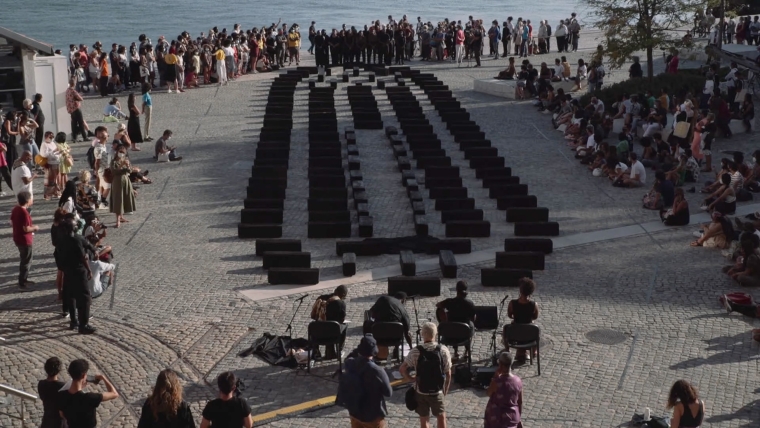The Boat
Poem and performance by Grada Kilomba
The Boat opens with a happening, where movement and a song of lamentation are performed. Several communities of the African diasporas, from different generations, are invited to become part of the ensemble, with whom a performance is staged.
The communities become the voice, the body and the storyteller of a history that has been made memorised.
The Boat becomes the ceremony and the physical presence of what has to be remembered.
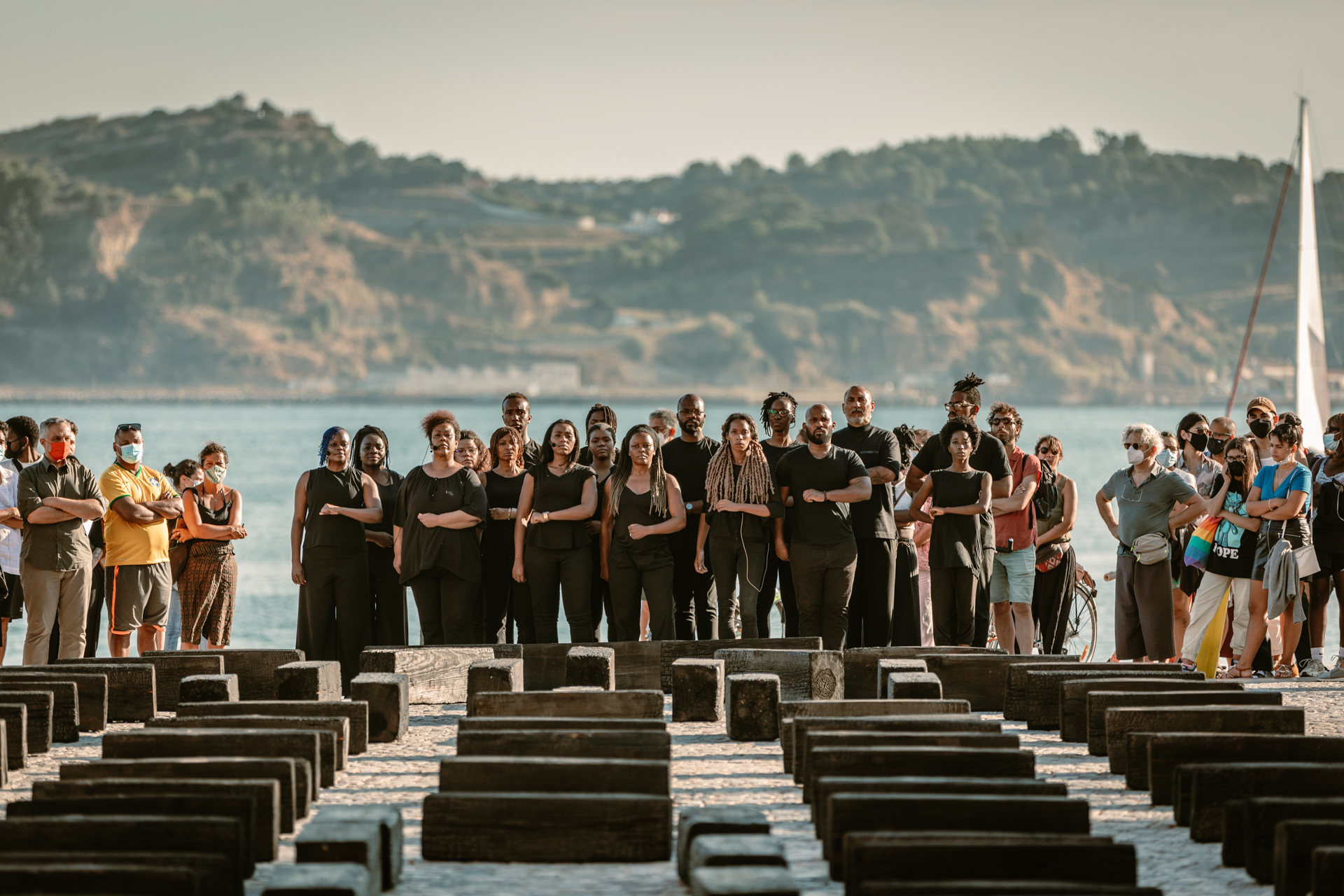
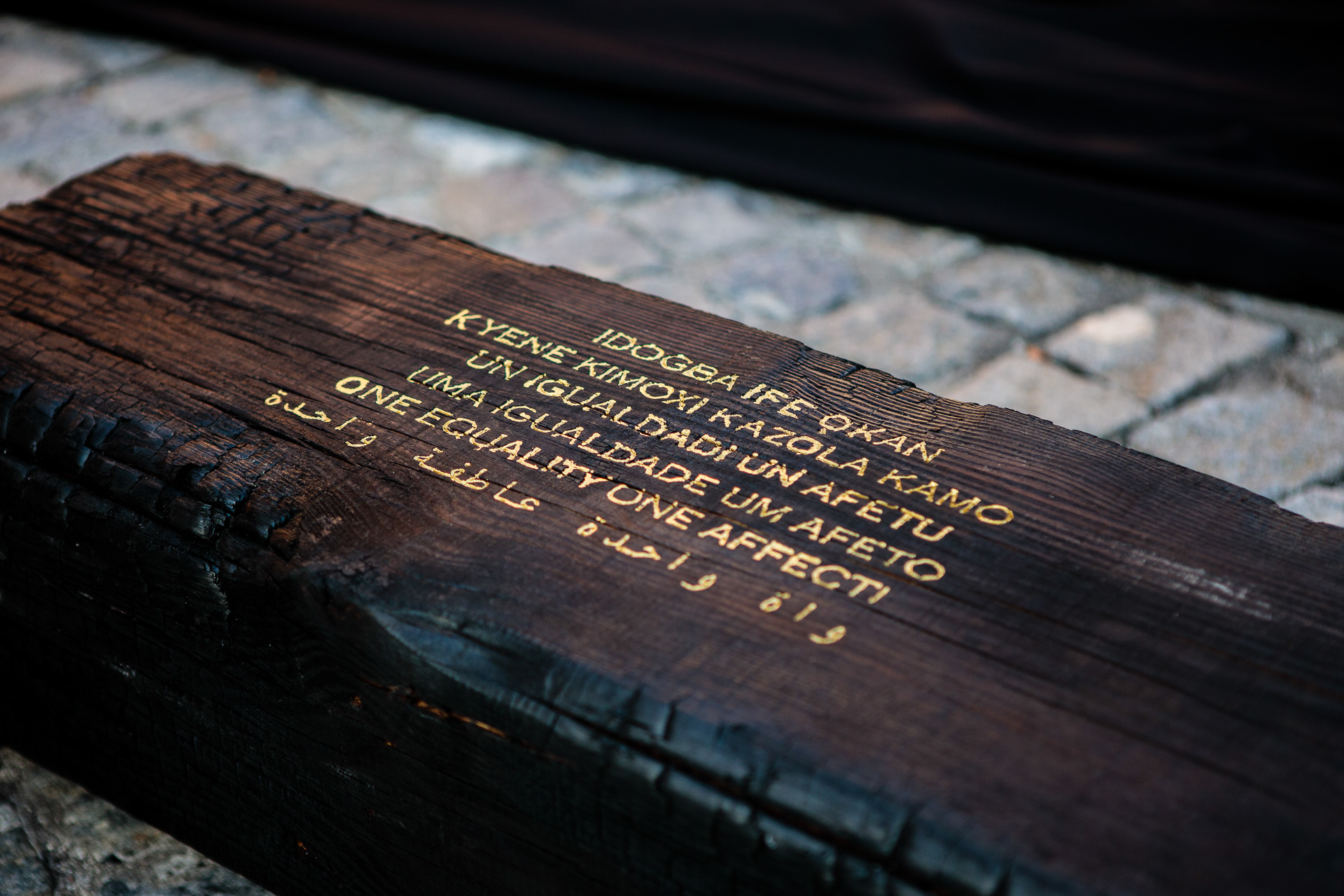
⤧
O Barco / The Boat
One boat one cargo hold
One cargo hold one load
One load one story
One story one piece
One piece one life
One life one body
One body one person
One person one being
One being one soul
One soul one memory
One memory one oblivion
One oblivion one wound
One wound one death
One death one sorrow
One sorrow one revolution
One revolution one equality
One equality one affection
One affection Humanity
Grada Kilomba, 2021
O Barco / The Boat
Um barco um porão
Um porão uma carga
Uma carga uma história
Uma história uma peça
Uma peça uma vida
Uma vida um corpo
Um corpo uma pessoa
Uma pessoa um ser
Um ser uma alma
Uma alma uma memória
Uma memória um esquecimento
Um esquecimento uma ferida
Uma ferida uma morte
Uma morte uma dor
Uma dor uma revolução
Uma revolução uma igualdade
Uma igualdade um afeto
Um afeto a humanidade
Grada Kilomba, 2021
O Barco / The Boat / Ọkọ (2021)
Ọkọ omi kan gbe ẹrù kan
Ọkọ ẹrù kan di ẹrù kan mu
ẹrù kan itan kan
itan kan eya kan
nkan kan ni igbesi aye
aye kan ara kan
ara kan eniyan kan
eniyan kan lẹ ni kan
eniyan kan ẹmi kan
ẹmi kan iranti kan
iranti kan ọkan igbagbe
igbagbe kan egbo kan
egbo kan iku kan
iku kan ibanuje kan
ibanuje kan iyika kan
iyika kan idogba kan
idogba ife ọkan
ọkan ife ẹda eniyan
Grada Kilomba, 2021
Translated to Yoruba by Adetoun Küppers-Adebisi.
O Barco / The Boat / O Barku
Un barku un puron
Un puron un karga
Un karga un stória
Un stória un pesa
Un pesa un vida
Un vida un korpu
Un korpu un pesoa
Un pesoa un ser
Un ser un Alma
Un Alma un memória
Un memória un skecimentu
Un skecimentu un frida
Un frida un morti
Un morti un dor
Un dor un revoluson
Un revoluson un igualdadi
Un igualdadi un afetu
Un afetu nôs humanidadi
Grada Kilomba, 2021
Translated to Kriolo from Cape Verde by Dino D’Santiago.
يا باركو | القارب غرادا كيلومبا (إنجلترا
مركب واحد للبضائع
حمولة واحدة تحمل حمولة واحدة
حمولة واحدة قصة واحدة
.قصة واحدة قطعة واحدة
قطعة واحدة في الحياة
.حياة واحدة جسد واحد
.جسد واحد شخص واحد
شخص واحد كائن واحد
كائن واحد روح واحدة
.روح واحدة ذاكرة واحدة
ذكرى واحدة نسيان واحد
.نسيان واحد جرح واحد
.جرح واحد موت واحد
موت واحد حزن واحد
.حزن واحد ثورة واحدة
.ثورة واحدة مساواة واحدة
مساواة واحدة عاطفة واحدة
عاطفة واحدة هي الإنسانية
Grada Kilomba, 2021
Translated to Arabic by Alhasan Mohamad.
O Barco / The Boat / Ó Ulungu
Ulungu umoxi Kixima kimoxi
Kixima kimoxi dibunda dimoxi
Dibunda dimoxi musoso umoxi
Musoso umoxi kima kimoxi
Kima kimoxi mwenhu umoxi
Mwenhu umoxi Muthu umoxi
Muthu umoxi dyala dimoxi
Dyala dimoxi kukala kumoxi
Kukala kumoxi nzumbi umoxi
Nzumbi umoxi kaximonya kamoxi
Kaximonya kamoxi kujima kumoxi
Kujima kumoxi Udikwama umoxi
Udikwama umoxi kalunga kamoxi
Kalunga kamoxi Udikwama umoxi
Udikwama umoxi nvunda umoxi
Nvunda umoxi kyene kimoxi kimoxi
Kyene kimoxi Kazola kamoxi
Kazola kamoxi ni athu
Grada Kilomba, 2021
Translated to Kimbundu by Kavulanduge Kimbari.
O Barco / The Boat / Sekepe
Sekepe se le sengwe ke polokelo ya morwalo e le nngwe
Polokelo ya morwalo e le nngwe ke thoto e le nngwe
Thoto e le nngwe ke kgang e le nngwe
Kgang e le nngwe ke karolo e le nngwe
Karolo e le nngwe ke bophelo bo le bongwe
Bophelo bo le bongwe ke mmele o le mongwe
Mmele o le mongwe ke motho a le mongwe
Motho a le mongwe ke sebopiwa se le sengwe
Sebopiwa se le sengwe ke moya o le mongwe
Moya o le mongwe ke kgakologelo e le nngwe
Kgakologelo e le nngwe ke tebalego e le nngwe
Tebalego e le nngwe ke ntho e le nngwe
Ntho e le nngwe ke loso lo le lengwe
Loso lo le lengwe ke kutlhobotlhoko e le nngwe
Kutlobotlhoko e le nngwe ke tsogelo-kgatlhanong e le nngwe
Tsogelo-kgatlhanong e le nngwe ke tekatekano e le nngwe
Tekatekano e le nngwe ke lerato lo le lengwe
Lerato lo le lengwe ke botho bo le bongwe
Grada Kilomba, 2021
Translated to Setswana by Joan Legalamitlwa.
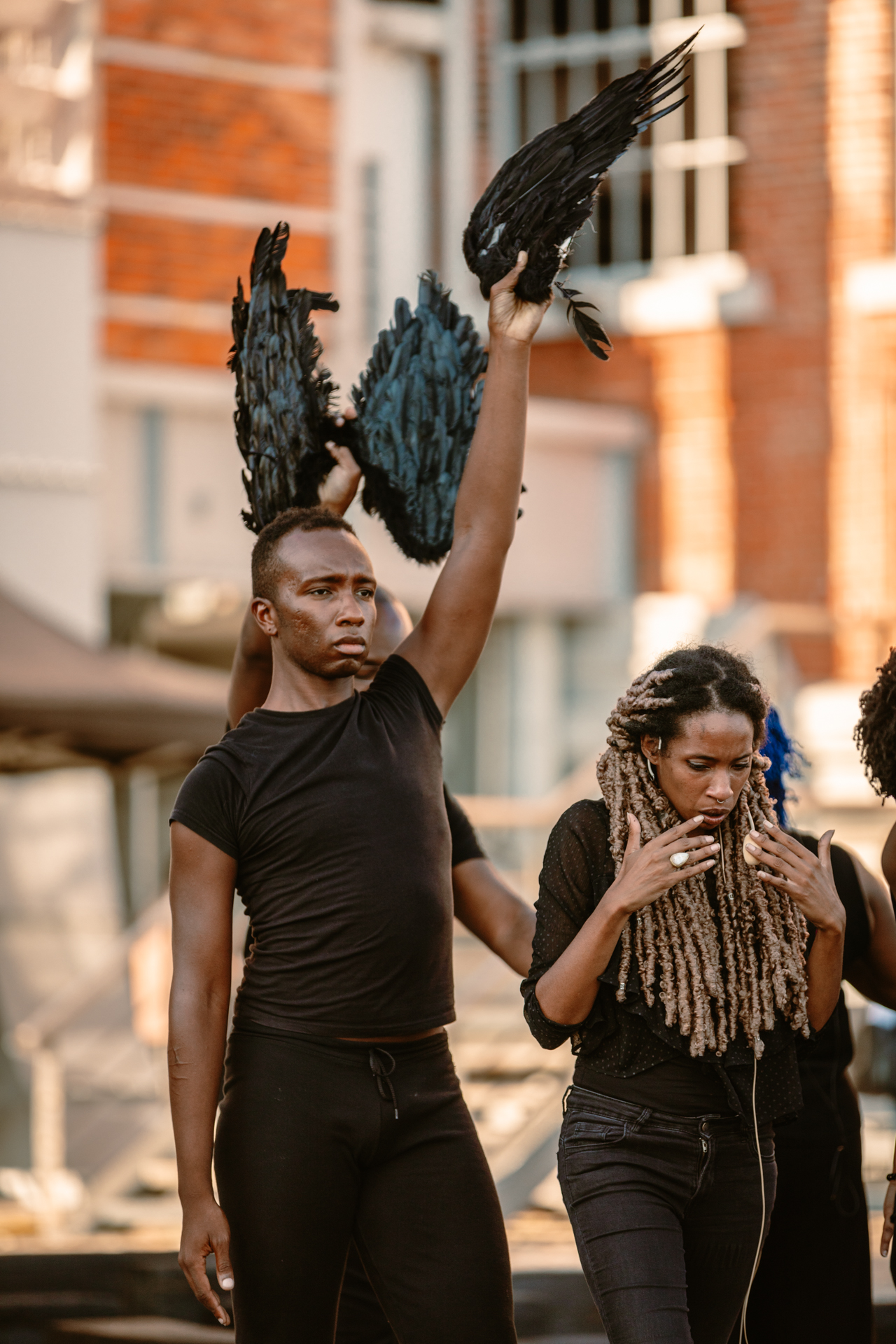
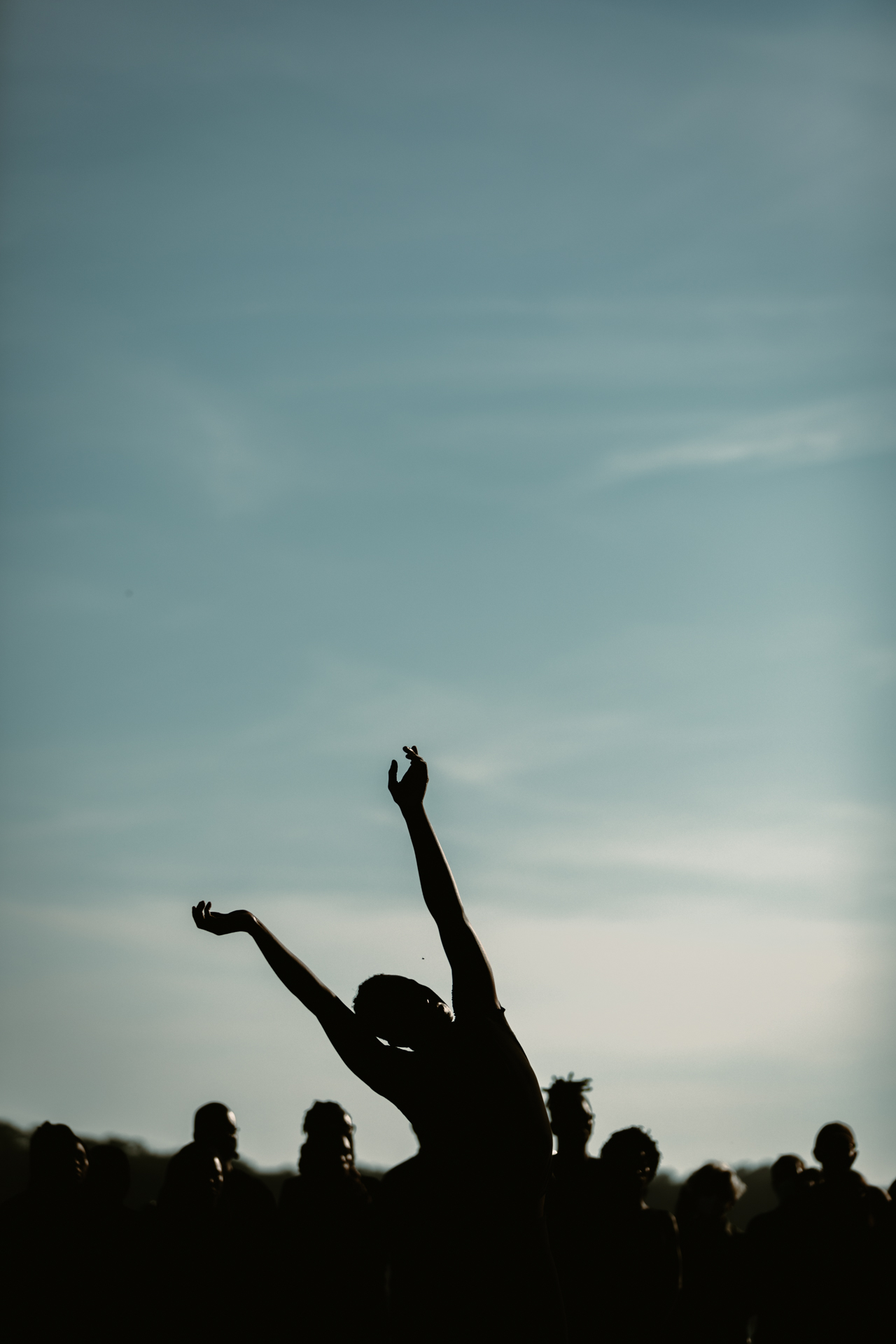
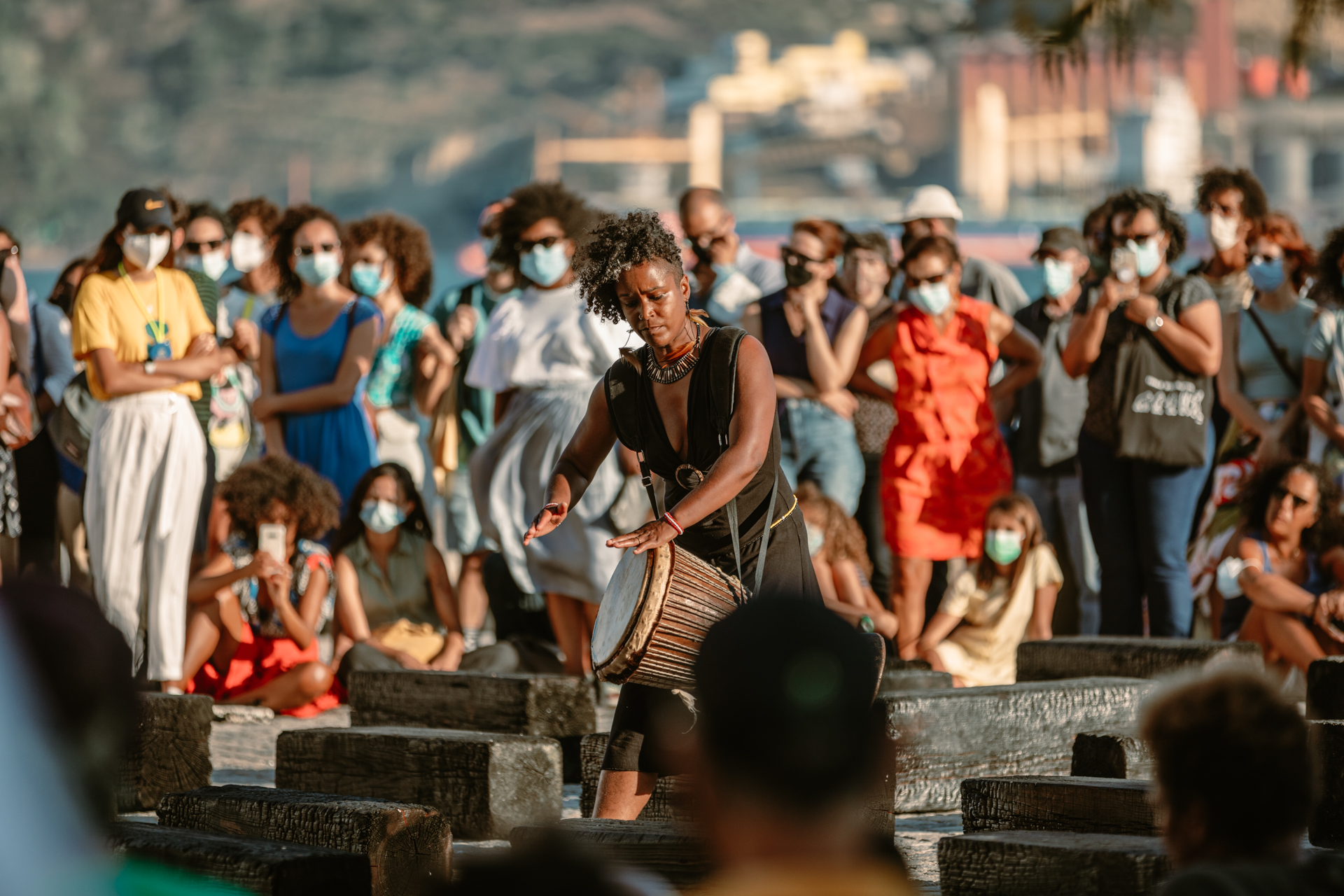
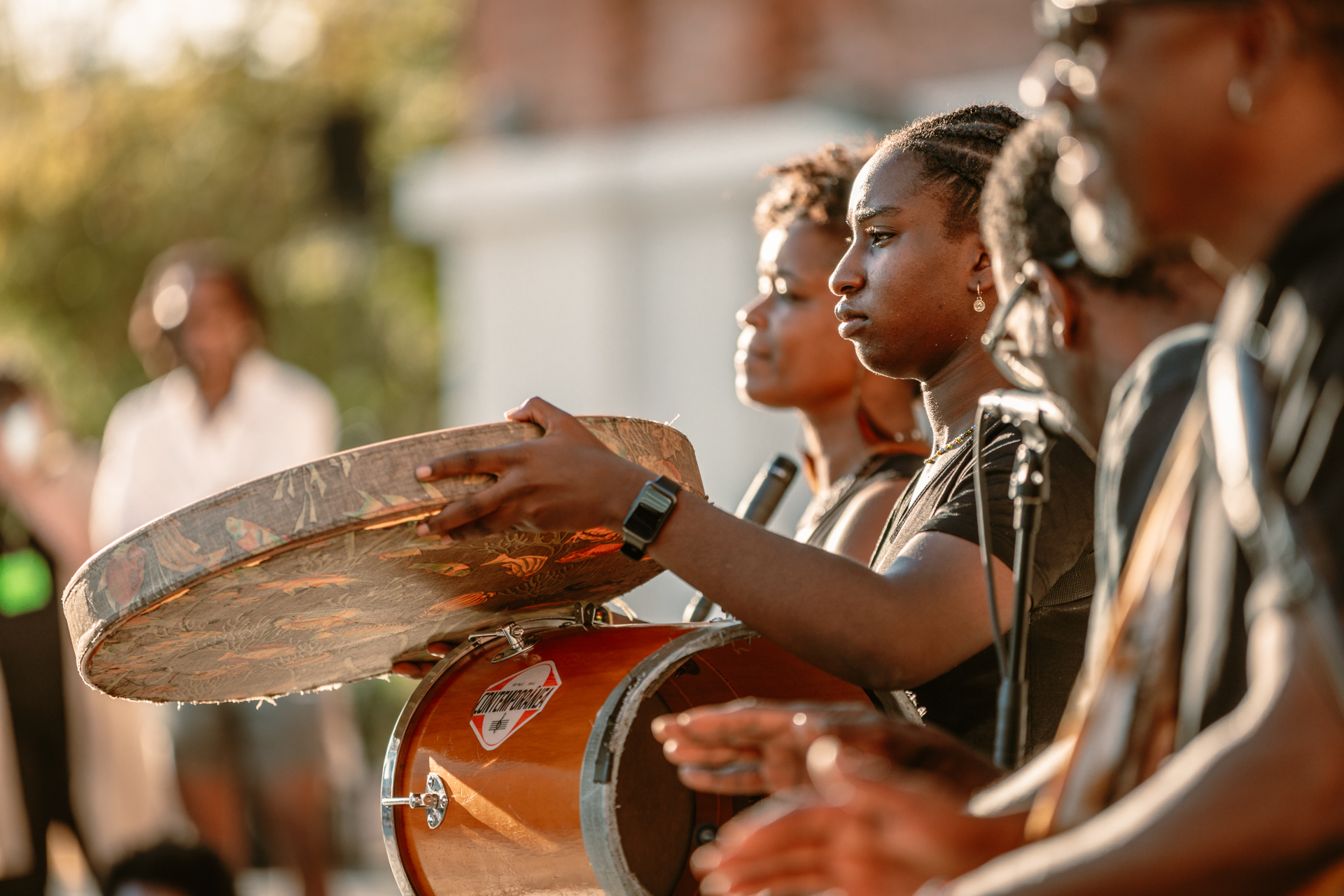
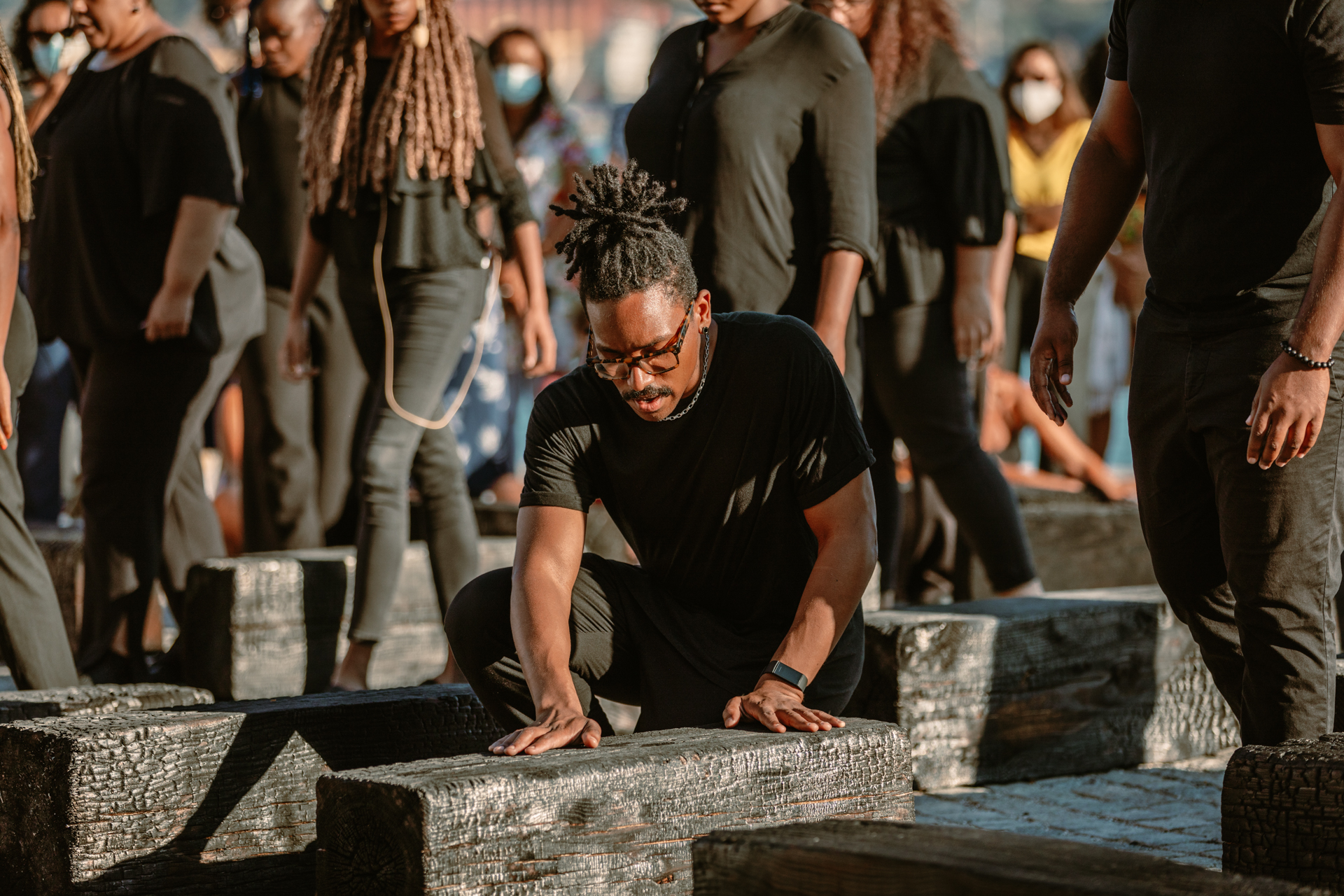
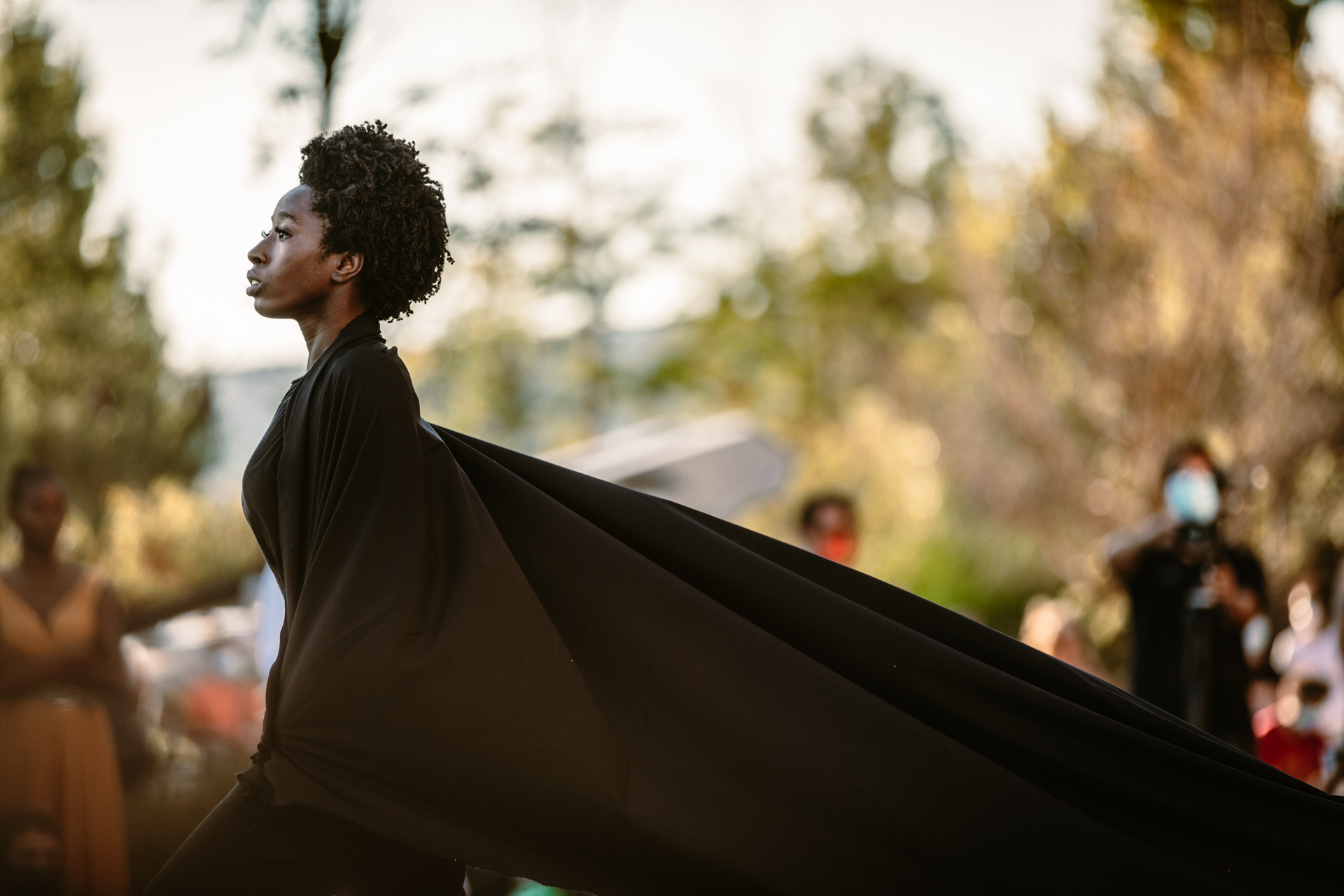
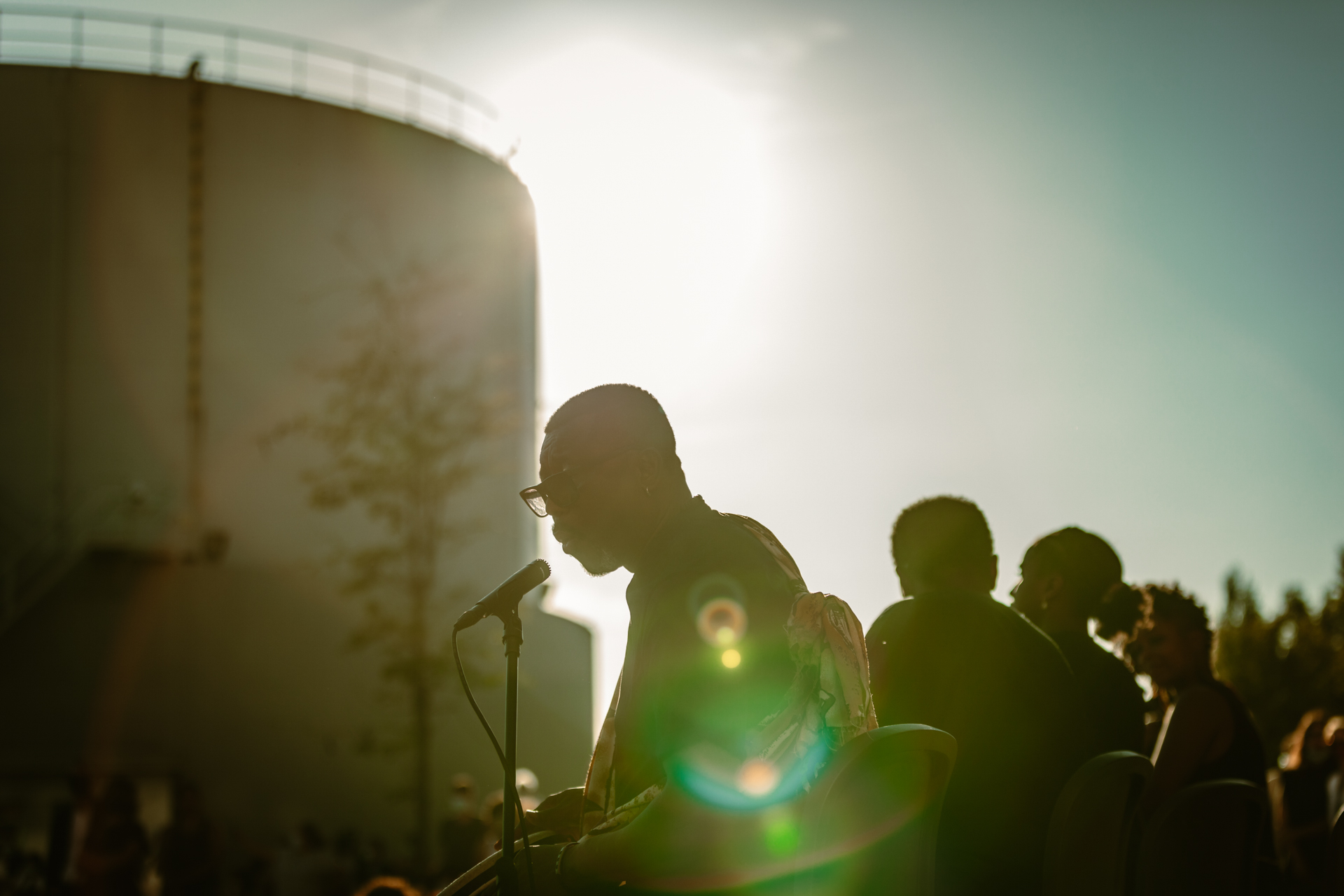
Views of the performance “O Barco / The Boat” (2021) by Grada Kilomba (maat, 03/09/2021, 18.00–19.00). Photos: By Agency, courtesy of the artist and EDP Foundation / maat.
Grada Kilomba is a Portuguese artist based in Berlin, whose work draws on memory, trauma, violence, and the post-colonial condition. Best known for her subversive writing and poetic imagery, Kilomba published Plantation Memories: Episodes of Everyday Racism in 2008. Reprinted in multiple editions and translated to different languages, the book examines, via a psychoanalytic lens, the methods used to dehumanise and oppress Black people throughout history.
In her multimedia installations, Kilomba creates a critical and immersive space of storytelling, to explore what she calls the “colonial wound”, using performance, choreography, staged reading, theatre, video, photography and installation. Her work has been presented in major international venues such as Lubumbashi Biennale (2019), Berlin Biennale (2018); Documenta (Kassel, 2017), São Paulo Biennale (2016), among many other. Heroines, Birds and Monsters is her first solo exhibition in the United States, at the Amant Foundation, Brooklyn.
O Barco / The Boat is Grada Kilomba’s first large-scale installation. Stretching 32 meters along the Tagus river, it invites the audience to enter a garden of memory in which a poem, translated into various languages – from Yoruba and Kimbundu to Creole and Setswana, as well as Portuguese, English and Arabic – rests on burnt wooden blocks, recalling forgotten stories and identities. In the Western imaginary, a ship is easily associated with glory, freedom, and maritime expansion, described as “discoveries” but Kilomba’s boat carefully draws the space created to accommodate the bodies of millions of Africans, enslaved by European empires. A performance in three acts, in which several generations of Afro-descendant communities are the central interpreters, turns the O Barco / The Boat into a place of acknowledgement, a garden of memory, but also a viewpoint to the future.
This project is commissioned and co-produced by BoCA, maat and Kunsthalle Baden-Baden, in partnership with Câmara Municipal de Lisboa/EGEAC within the programme Lisboa na Rua'21. The production support is by ArtWorks.


